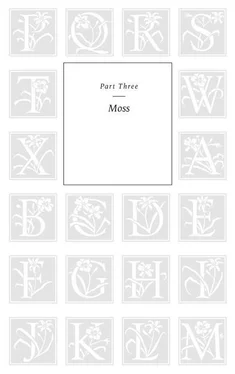Vanessa Diffenbaugh - The Language of Flowers
Здесь есть возможность читать онлайн «Vanessa Diffenbaugh - The Language of Flowers» весь текст электронной книги совершенно бесплатно (целиком полную версию без сокращений). В некоторых случаях можно слушать аудио, скачать через торрент в формате fb2 и присутствует краткое содержание. Жанр: Старинная литература, на английском языке. Описание произведения, (предисловие) а так же отзывы посетителей доступны на портале библиотеки ЛибКат.
- Название:The Language of Flowers
- Автор:
- Жанр:
- Год:неизвестен
- ISBN:нет данных
- Рейтинг книги:4 / 5. Голосов: 1
-
Избранное:Добавить в избранное
- Отзывы:
-
Ваша оценка:
- 80
- 1
- 2
- 3
- 4
- 5
The Language of Flowers: краткое содержание, описание и аннотация
Предлагаем к чтению аннотацию, описание, краткое содержание или предисловие (зависит от того, что написал сам автор книги «The Language of Flowers»). Если вы не нашли необходимую информацию о книге — напишите в комментариях, мы постараемся отыскать её.
The Language of Flowers — читать онлайн бесплатно полную книгу (весь текст) целиком
Ниже представлен текст книги, разбитый по страницам. Система сохранения места последней прочитанной страницы, позволяет с удобством читать онлайн бесплатно книгу «The Language of Flowers», без необходимости каждый раз заново искать на чём Вы остановились. Поставьте закладку, и сможете в любой момент перейти на страницу, на которой закончили чтение.
Интервал:
Закладка:
“My bedroom,” Grant said.
“Where do you sleep?” I asked.
“In the middle. Closer to the books than the clothes, usually.” He climbed across the foam mattress and switched off the reading lamp. I held on to the banister and climbed back down into the kitchen.
“Nice,” I said. “Quiet.”
“I like it that way. I can forget where I am, you know?” I did know. In Grant’s water tower, settled in the absence of all things automatic and digital, it was easy to forget not just the location but also the decade.
“My roommate’s punk band practices all night in the downstairs of our apartment,” I said.
“That sounds awful.”
“It is.”
He walked over to the counter and spooned hot, soggy rice into large ceramic soup bowls. He handed me a bowl and a spoon. We began to eat. The rice warmed my mouth, throat, and stomach. It was much better than I had expected.
“No phone?” I asked, looking around. I’d thought I was the only young person in the modern world not attached to a communication device. Grant shook his head no. I continued: “No other family?”
Grant shook his head again. “My father left before I was born, went back to London. I’ve never met him. When my mother died, she left me the land and the flowers, nothing else.” He took another bite of rice.
“Do you miss her?” I asked.
Grant poured on more soy sauce. “Sometimes. I miss her as she was when I was a child, when she cooked dinner every night and packed my lunches with sandwiches and edible flowers. But toward the end of her life, she began to confuse me with my father. She’d go into a rage and throw me out of the house. Then, when she realized what she’d done, she would apologize with flowers.”
“Is that why you live here?”
Grant nodded. “And I’ve always liked being alone. No one can understand that.” I understood.
He finished his rice and helped himself to another bowl, then reached for mine and filled it up as well. We ate the rest of the meal in silence.
Grant got up to wash his dish and set it upside down on a metal drying rack. I washed my own and did the same. “Ready to go?” he asked.
“The film?” I grabbed the camera from where he had hung it on a hook and handed it to him. “I don’t know how to release it.”
He rewound the camera and unloaded the film. I pocketed it.
“Thanks.”
We climbed into Grant’s truck and started down the road. We were halfway back to the city when I remembered Annemarie’s request. I sucked in my breath.
“What?” he asked.
“The jonquil. I forgot.”
“I planted it while you were in the rose garden. It’s in a paper box in the greenhouse—the bulbs require darkness until the foliage starts to grow. You can check on them next Saturday.”
Next Saturday. As if we had a standing date. I watched Grant drive, his profile hard and unsmiling. I would check on them next Saturday. It was a simple statement but one that changed everything as completely as the discovery of the yellow rose.
Jealousy, infidelity. Solitude, friendship .
6 .
It was dark out by the time I came in for dinner. The house was bright , and inside the frame of the open door, Elizabeth sat alone at the kitchen table. She had made chicken soup—the smell had reached me in the vines, the scent a physical draw—and she sat hunched over her bowl, as if studying her reflection in the broth.
“Why don’t you have any friends?” I asked.
The words escaped without premeditation. For a week I’d watched Elizabeth manage the harvest with a heavy, dejected quality, and the image of her sitting at the kitchen table, alone and so obviously lonely, pushed the words right out of me.
Elizabeth looked over to where I stood. Quietly, she stood up, dumping the contents of her bowl back into the soup pot. With a match, she lit the blue ring of fire beneath it.
She turned to me. “Well, why don’t you?”
“I don’t want any,” I said. Besides Perla, the only children I knew were from my class at school. They called me orphan girl , and it had gotten so that I doubted even my teacher remembered my real name.
“Why not?” Elizabeth pressed.
“I don’t know,” I said, my voice growing defensive. But I did know.
I had been suspended for five days for my attack on the school bus driver, and for the first time in my life, I was not miserable. Home with Elizabeth, I didn’t need anyone else. Every day I followed behind as she managed the harvest, steering workers toward ripe vines and away from grapes that needed another day in the sun, another two. She popped grapes into her own mouth and then into mine, spewing numbers that correlated to the ripeness: 74/6, 73/7, and 75/6. This , she would say, when we located a ripe bunch, is what you need to remember. This exact flavor—the sugars at seventy-five, the tannins at seven. This is a perfectly ripe wine grape, which neither machine nor amateur can identify . By the end of the week, I had chewed and spit grapes from nearly every plant, and the numbers began to come to me almost before the grapes entered my mouth, as if my tongue was simply reading them like the number on a postage stamp.
The soup began to simmer, and Elizabeth stirred it with a wooden spoon. “Take off your shoes,” she said. “And wash up. The soup’s hot.”
At the table, Elizabeth set out two bowls and loaves of bread as big as cantaloupes. I tore the bread in half, scooping out the soft, white middle and dipping it in the steaming broth.
“I had a friend, once,” Elizabeth said. “My sister was my friend. I had my sister and my work and my first love, and there was nothing else in the world I wanted. Then, in an instant, all I had was my work. What I lost felt irreplaceable. So I focused every waking moment on running a successful business, on growing the most sought-after wine grapes in the region. The goal I set was so ambitious, and took so much time, that I didn’t have even a minute to think about everything I’d lost.”
Taking me in, I understood, had changed that. I was a constant reminder of family, of love, and I wondered if she regretted her decision.
“Victoria,” Elizabeth asked abruptly. “Are you happy here?”
I nodded, my heartbeat suddenly racing. No one had ever asked me a question like that without immediately following with something like, because if you were happy, if you had the sense to know that you were lucky to be here, you wouldn’t act like such an ungrateful little brat . But Elizabeth’s smile, when it finally came, was only relieved. “Good,” she said. “Because I’m happy you’re here. In fact, I’m not looking forward to you going back to school tomorrow. It’s been nice having you home; you’ve opened up a little. For the first time, you’ve seemed interested in something, and while I admit I’m a bit jealous of the grapes, it does bring me joy to see you engaging in the world.”
“I hate school,” I said. Just uttering the word made my soup bubble up at the back of my throat, a sick, nauseous feeling.
“Do you really hate school? Because I know you don’t hate to learn.”
“I really hate it.” I swallowed once, and then told her what they called me, told her it was just like every school I’d ever been to, that I was singled out, labeled, watched, and never taught.
Elizabeth took her last bite of bread, and then carried her bowl to the sink.
“We’ll withdraw you tomorrow, then. I can teach you more here than you’ll ever learn in that school. And if you ask me, you’ve suffered enough for one lifetime.” She came back to the table, retrieved my bowl, and refilled it to the brim.
My relief was so expansive I finished the second bowl, and then a third. Still, an internal lightness threatened to lift me off the chair and throw me, spinning, up the stairs and into bed.
Читать дальшеИнтервал:
Закладка:
Похожие книги на «The Language of Flowers»
Представляем Вашему вниманию похожие книги на «The Language of Flowers» списком для выбора. Мы отобрали схожую по названию и смыслу литературу в надежде предоставить читателям больше вариантов отыскать новые, интересные, ещё непрочитанные произведения.
Обсуждение, отзывы о книге «The Language of Flowers» и просто собственные мнения читателей. Оставьте ваши комментарии, напишите, что Вы думаете о произведении, его смысле или главных героях. Укажите что конкретно понравилось, а что нет, и почему Вы так считаете.












